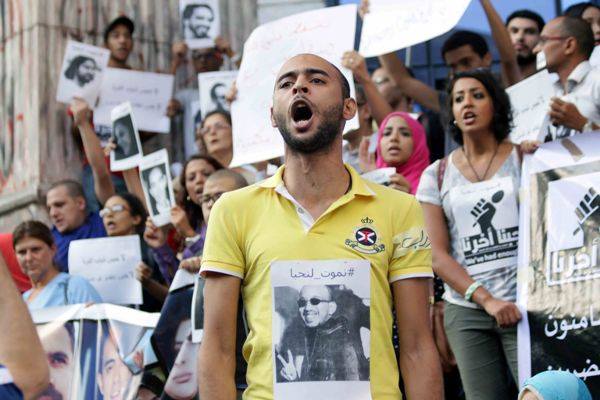Latest NEWS
- Aswat Masriya, the last word
- Roundup of Egypt's press headlines on March 15, 2017
- Roundup of Egypt's press headlines on March 14, 2017
- Former Egyptian President Hosni Mubarak to be released: lawyer
- Roundup of Egypt's press headlines on March 13, 2017
- Egypt's capital set to grow by half a million in 2017
- Egypt's wheat reserves to double with start of harvest -supply min
- Roundup of Egypt's press headlines on March 12, 2017
Calls for one-day hunger strike in solidarity with those "unjustly detained"

By Rana Muhammad Taha
CAIRO, Sept 16 (Aswat Masriya) – Activists are campaigning for a one-day hunger strike on Wednesday as a show of solidarity with Egypt's "unjustly detained."
The "Fast for Freedom" campaign is part of a larger hunger strike campaign which kicked off in August, gaining momentum by the day.
The Freedom for the Brave, a movement calling for the release of those detained pending politically-motivated charges and one of the movements most actively supporting the campaign, organised an international solidarity day with hunger striking detainees on Saturday and Sunday. The movement said the final toll of "symbolic" hunger strikers on those two days reached 295 inside and outside prisons.
Egyptian-American journalist Mohamed Soltan has been on hunger-strike since January 25 in protest over his detention, maintaining the longest hunger strike among those detained. Soltan was arrested from his home on August 27, last year after the deadly dispersal of two camps set up in support of former President Mohamed Mursi following his ouster in July 2013.
On hunger strike for 233 days, Soltan's life is believed to be in danger as he awaits his next trial session on September 23. He has reportedly been transferred to the prison's hospital due to his deteriorating health condition.
The Cairo-based Association for Freedom of Thought and Expression (AFTE) called for the release of Soltan and another seven journalists arrested while on duty and detained pending trial.
"AFTE condemns the use of preventive detention as a punitive measure rather than a precautionary measure against journalists and photojournalists," the association said in a statement released on Monday.
A number of journalists announced on Saturday going on a solidarity hunger strike for two days in protest over the protest law.
Former interim President Adli Mansour issued the protest law on November 24 to regulate peaceful assembly. The law has long been the epicentre of wide criticism by domestic and international human rights organisations which say it violates international standards for peaceful protests.
The legislation obliges demonstrators to inform the authorities of their intention to assemble three days prior to their scheduled events. It also gives the interior ministry the right to cancel, postpone or move protests.
On Monday, April 6 Youth Movement co-founder Ahmed Maher announced going on hunger strike. Maher was sentenced to three years in prison in December for violating the protest law, alongside other April 6 co-founder Mohamed Adel and prominent political activist Ahmed Douma.
Douma started a hunger strike on August 28 to protest his imprisonment. The political activist's lawyer Osama al-Mahdy visited him in prison on Tuesday. Mahdy told Aswat Masriya Douma's health condition is in constant deterioration.
"We submitted a request today to refer him to a governmental hospital at his own expense for treatment," Mahdy said. He added that the request remains pending.
Other hunger-striking detainees include Sanaa Seif, who is facing trial alongside 23 others for violating the protest law, and her brother Alaa Abdel Fattah, who was sentenced to 15 years in prison alongside 24 others also for violating the same law.
The Cairo Criminal Court released Abdel Fattah and two other defendants on Monday on a 5000 Egyptian pound-bail pending their retrial.
Mona Seif, Seif and Abdel Fattah's sister, announced on Monday upholding her hunger strike despite her brother's release from jail. Seif went on hunger strike over two weeks ago.
"My hunger strike continues," Seif, who founded the No Military Trials for Civilians movement in 2011, said on her personal twitter account. "Our family is still missing the most beautiful and most courageous among us; Sanaa."
Egypt's Head of the Prison Investigations, General Mohamed Ali Hussein denied to Aswat Masriya last week the existence of any hunger-striking prisoners in all Egyptian prisons.
"All those people eat and drink regularly every day," Hussein said, in reference to Seif, Abdel Fattah and Douma. "Had they been on hunger-strike, they would have died a long time ago."
The state-affiliated National Council for Human Rights visited Douma, Abdel Fattah, and a third hunger striking prisoner 10 days ago.
Hunger strikes have lately become a common tool to protest detention, used by those arrested for political reasons.
Journalist Abdullah al-Shamy maintained a hunger strike for over 100 days before the country's top prosecutor ordered his release on medical grounds in June. Shamy, and 12 others, were arrested on August 14 during the dispersal of two sit-ins held in support of Mursi.
(Additional reporting by Marium Mohamed)










